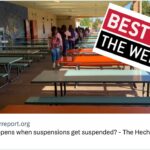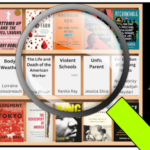If you think perhaps I’m overly harsh on education journalists, take a look at this post from the right-leaning rascals at EducationNews.org.
“Journalism around education policy is broken,” says testing expert Richard P. Phelps in an interview with Barry Garelick, who focuses his critique on Education Next (a think-tank journal), Education Week, and the Hechinger Report.
A lot of it seems to my eye to be over the top, overgeneralized, unspecific complaining about trade reporters, and the few responses I’ve seen so far have generally contradicted what Phelps is claiming.
But there are some points worth pondering, including (a) many reporters’ over-reliance on the same sets of quasi-qualified sources and experts who are most available and quotable but perhaps not the most knowledgeable in their field, (b) lack of disclosure about how a story has been pitched or supported by an advocacy group or PR firm behind the scenes (not to mention the role of philanthropy-washingtonmonthly-com-funded coverage), and (c) the advantages non-education reporters sometimes have in bringing fresh eyes and independence to the stories they’re covering (which is why editors used to make reporters change beats every so often).
In a post titled Are Education Journalists Objective or Players in the Game?, Gorelick interviews Richard P. Phelps, the author of Standardized Testing Primer, Kill the Messenger: The War on Standardized Testing and other books about testing.
In a long Q and A, Phelps says things like this on education journalism in general:
Massive bodies of evidence and theory are ignored by US education journalists simply because they rely on small, homogenous, and unrepresentative groups to represent vast, heterogeneous realms of evidence and opinion.
US education policy formation is rife with fraud, censorship, and information suppression. Journalists in other fields tend to be very interested in such things. Not our education journalists. Education journalists are players in the game, and wish to continue as such. That means playing up to those in power, just as those in power play up to them.
On Education Week:
Ed Week itself publishes stories on demand. Groups pay to have the topics that interest them covered. Of course, Ed Week says that they cover those topics objectively—believe them if you like—but, meanwhile, they have let private, monied groups with agendas determine what their stories will be. So long as Ed Week covers the issues that matter to those who can pay them, it will not cover the issues that matter to those who cannot.
On the Hechinger Report:
Hechinger journalists rely on the highly visible, most heavily funded, and easiest-to-reach for expertise, even if those sources have no training or experience in the topic at hand. They’re too trusting of information supplied by other journalists. They believe that education research and policy-formation are on the up-and-up and so those with the most prestigious credentials must be the most knowledgeable and trustworthy. They ignore sources’ conflicts of interest. They believe dismissive reviews and report them as fact.
On the superiority of non-education journalists:
The journalists I have dealt with directly have represented their profession splendidly. But none of these journalists have been education specialists (i.e., members of the Education Writers Association (EWA), staffers at Education Week, or the like).
Not everyone agrees with Phelps’ assessment, including USA Today’s Greg Toppo.
“I barely know where to begin. I think Phelps misreads just about everything I’ve read lately in the journalism press. There’s a lot more sophistication there than he thinks. What exactly is he reading?”
“Is Phelps talking about the same EdNext that I read and have written for?,” comments Yehoshua Jason Bedrick on Tabor’s Facebook page. “It sure doesn’t seem like it. There’s more intellectual diversity, dissent, nuance, and expertise than he gives credit.”
I’ll ask the folks named in the piece for their thoughts — and welcome anyone else’s — but I’m not sure that the critique is serious enough to warrant much of a response.
Disclosures: I’ve written several times for Education Next, and know and have worked with several folks at EdWeek and the Hechinger Report.
ABOUT THE AUTHOR

Alexander Russo
Alexander Russo is founder and editor of The Grade, an award-winning effort to help improve media coverage of education issues. He’s also a Spencer Education Journalism Fellowship winner and a book author. You can reach him at @alexanderrusso.
Visit their website at: https://the-grade.org/










